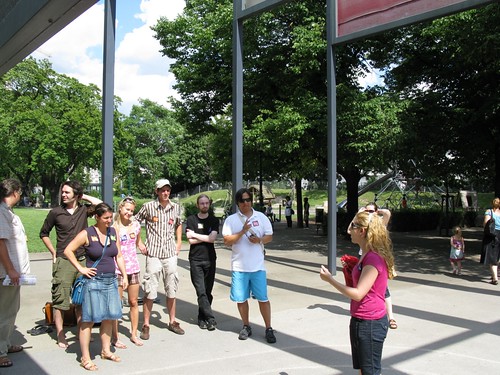Earlier this month, on a Saturday afternoon, I found myself walking around the Stadtpark in Vienna, looking for someone called Jane, to play an Olympic sport that was apparently banned 2 000 years ago. If this all sounds a little weird, it’s because it was.
The event was part of an alternate reality game (ARG) called The Lost Ring. According to Wikipedia, an ARG is “an interactive narrative that uses the real world as a platform, often involving multiple media and game elements, to tell a story that may be affected by participants’ ideas or actions”. It’s often a massively multiplayer game, set in the realm of real physical spaces, which uses telephones, email and mail but “relies on the internet as the central binding medium”.
In South Africa, the Sunday Times has, over the years, run an annual competition called Finders Keepers. Every week clues are revealed in the paper that require the players to search encyclopedias, old newspapers and trivia tomes, to ask neighbours about rock bands long gone or children about popular culture figures. The national game eventually has one winner who finds the treasure — R1-million.
ARGs are a bit like that, except that the clues are much more cryptic. Many different people with many different skills sets are required to solve them: historians, linguists, archaeologists, sports lovers and so forth. The players self-organise via the web and when the mystery is solved, everyone wins.
Jane McGonical, who I was looking for in Vienna, is one of the world’s leading puppetmasters (“an individual involved in designing and/or running an ARG”). The game we played that afternoon — The Lost Sport of Olympia — is one of the key pieces of evidence in the Lost Ring ARG. Through much detective work, other ARG players had worked out the rules of the physical game, the banned ancient (fictitious) Olympic sport.
It’s a silly affair with players making up a human wall of a labyrinth, from which a blindfolded runner tries to escape as quickly as possible. Oh yes, the wall hums to help guide the runner. The 12 or so of us who assembled in the park played for two hours and managed to set a new European record — see the YouTube video for all the fun.
Aside from the playfulness involved, do ARGs hold potential for learning? Yes. Playing these games develops two important new-media literacies: collective intelligence (“the ability to pool knowledge and compare notes with others toward a common goal”) and transmedia navigation (“the ability to follow the flow of stories and information across multiple modalities”). Collaboration, strategy and inquiry are other learning activities.
According to Jane, many ARGs are actually played in limited physical locations, for example around a town or neighbourhood, and only last a few weeks. There are even cases of teachers who ask their learners to create an ARG for the rest of the school.
I’m interested in the potential of ARGs for learning and will definitely keep watching this space. In the meantime, I’ll be watching the global labyrinth-off happening on August 23, with a team in Beijing playing against teams from every continent, except Africa. Anyone keen to be silly for a day and play in an ARG?



